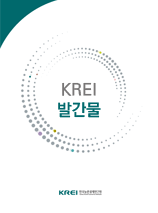- Impacts of Ukraine-Russia Conflict on Global Grain Prices
-
-
Global grain prices, which rose after the second half of 2020, expedited the speed amid the protracted war in Ukraine, mainly triggered by price surges in wheat, maize, and barley, which are the Black Sea region’s major exports.
• The Chicago Board of Trade (CBOT) futures prices of wheat, maize, and soybeans in March 2022 rose by 137.7%, 102.1%, and 72.0% compared with the average March prices. Concerns about grain export decrease in the Black Sea region due to the war and major grain exporters’ restriction on outbound shipments caused the rise.
Ukraine and Russia are one of the largest producers and exporters of maize, wheat, and sunflower oil.
• Ukraine’s shares in the international grain trade amount to 14% for maize, 9% for wheat, 10% for barley, and 43% for sunflower oil. Russia takes a 20% share for wheat, 14% for barley, and 20% for sunflower oil. The grains from the Black Sea region are mostly shipped to Europe, the Middle East, Southeast Asia, and China.
Russia’s war on Ukraine will likely raise wheat and maize prices by 10-20% in 2022/23. If the conflict continues longer than expected, price hikes will keep up.
• The region’s wheat and maize exports will likely decrease by 7 million tons and 6 million tons in 2021/22. Meanwhile, Ukraine’s spring crop output and cultivation areas for summer crops will shrink by 30% each.
South Korea highly depends on maize for processing (including non-GMO maize) and feed wheat exported from the Black Sea region. Although the nation can find replacements in other countries, upward pressures on domestic prices will be unavoidable.
• Korea relies on imported grains for assorted feed and food manufacturing. As a result, international supply bottlenecks and following price volatilities affect production activities in domestic industries such as feed and food processing, livestock production, and restaurants.
• Russia’s invasion of Ukraine drove up consumer prices of processed foods by 3.4-6.8%, dine-out services by 0.6-1.2%, and producer prices of animal feed by 5.3-10.6%.
In the short term, the government must develop replacement sources and extend financial and tax aid to minimize impacts on domestic prices. In the long term, it should expand domestic output bases,
including grain stockpiling, and help domestic grain distributors enter the international distribution market to set up the nation’s procurement platform.
• As grain prices surged amid the conflict in the Black Sea region after their rise in the second half of 2020, the government activated a response system led by the grain policy committee to tackle challenges from international price surges. -
목차
요약문
Global grain prices, which rose after the second half of 2020, expedited the speed amid the protracted war in Ukraine, mainly triggered by price surges in wheat, maize, and barley, which are the Black Sea region’s major exports.
• The Chicago Board of Trade (CBOT) futures prices of wheat, maize, and soybeans in March 2022 rose by 137.7%, 102.1%, and 72.0% compared with the average March prices. Concerns about grain export decrease in the Black Sea region due to the war and major grain exporters’ restriction on outbound shipments caused the rise.
Ukraine and Russia are one of the largest producers and exporters of maize, wheat, and sunflower oil.
• Ukraine’s shares in the international grain trade amount to 14% for maize, 9% for wheat, 10% for barley, and 43% for sunflower oil. Russia takes a 20% share for wheat, 14% for barley, and 20% for sunflower oil. The grains from the Black Sea region are mostly shipped to Europe, the Middle East, Southeast Asia, and China.
Russia’s war on Ukraine will likely raise wheat and maize prices by 10-20% in 2022/23. If the conflict continues longer than expected, price hikes will keep up.
• The region’s wheat and maize exports will likely decrease by 7 million tons and 6 million tons in 2021/22. Meanwhile, Ukraine’s spring crop output and cultivation areas for summer crops will shrink by 30% each.
South Korea highly depends on maize for processing (including non-GMO maize) and feed wheat exported from the Black Sea region. Although the nation can find replacements in other countries, upward pressures on domestic prices will be unavoidable.
• Korea relies on imported grains for assorted feed and food manufacturing. As a result, international supply bottlenecks and following price volatilities affect production activities in domestic industries such as feed and food processing, livestock production, and restaurants.
• Russia’s invasion of Ukraine drove up consumer prices of processed foods by 3.4-6.8%, dine-out services by 0.6-1.2%, and producer prices of animal feed by 5.3-10.6%.
In the short term, the government must develop replacement sources and extend financial and tax aid to minimize impacts on domestic prices. In the long term, it should expand domestic output bases,
including grain stockpiling, and help domestic grain distributors enter the international distribution market to set up the nation’s procurement platform.
• As grain prices surged amid the conflict in the Black Sea region after their rise in the second half of 2020, the government activated a response system led by the grain policy committee to tackle challenges from international price surges.저자정보
저자에게 문의
구매안내
KREI의 출판물은 판매 대행사 (정부간행물판매센터)와 아래 서점에서 구입 하실 수 있습니다.
판매대행사
- (주)정부간행물판매센터http://www.gpcbooks.co.kr사이트 바로가기
- 서울특별시 중구태평로 1가 25번지
- TEL 02) 394-0337, 734-6818
- FAX 02) 394-0339
판매서점
판매서점 교보문고 http://www.kyobobook.co.kr/ 영풍문고 http://www.ypbooks.co.kr/ 알라딘 http://www.aladin.co.kr/ 활용도 정보
활용도 정보 상세정보 조회 좋아요 다운로드 스크랩 SNS공유 2464 0 4 0 0 -
- Suggestions to Promote the Hometown Love Donation System
- Gouk, Seungyong
- 2022.11.25
- KREI 이슈리포트
-
- Ten Years of Korea-U.S. FTA: focusing on agri-food trade
- Kim, Kyungphil
- 2022.06.09
- KREI 이슈리포트
-
- The Impacts of the COVID-19 on the Korean Agricultural Market
- Seo, Hong-Seok
- 2020.06.05
- KREI 이슈리포트
-
- 10 Agricultural Policy Issues of Korea in 2019
- Jeong, Minkook
- 2019.01.29
- KREI 이슈리포트
-
- State of Korean and Overseas Markets for Environment-Friendly Agricultural Products and Challenges 2018
- Jeong, Hakkyun; Sung, Jaehoon; Lee, Hyeonjeong
- 2018.09.12
- KREI 이슈리포트
-
- Measures to Establish the Water-Energy-Food Nexus for Agricultural Resource Management
- Sung, Jaehoon; Cho, Wonju; Lee, Hyeonjeong
- 2018.09.05
- KREI 이슈리포트
-
- Changes in the Trade of Agricultural and Livestock Products and Implications after Seven Years from the Enforcement of the Korea-EU FTA
- Song, Woojin; Lee, Hyunkeun; Myeong, Suhwan; Yoo, Juyoung
- 2018.06.29
- KREI 이슈리포트
-
- 10 Agricultural Policy Issues of Korea in 2018
- Kim, Byoungryul
- 2018.01.22
- KREI 이슈리포트
-
- Income Changes by Type of Farm Household and Implications
- Woo, Byungjoon
- 2017.11.30
- KREI 이슈리포트
-
- Fact-checking of Unbalanced Korea-U.S. Trade and Countermeasures in the Agricultural Sector
- Lee, Hyunkeun; Myeong, Suhwan; Lim, Chehwan; Song, Woojin
- 2017.10.17
- KREI 이슈리포트
-
- 10 Agricultural Policy Issues of Korea in 2019
- Jeong, Minkook
- 2019.01.29
- KREI 이슈리포트
-
- Income Changes by Type of Farm Household and Implications
- Woo, Byungjoon
- 2017.11.30
- KREI 이슈리포트
-
- 10 Agricultural Policy Issues of Korea in 2018
- Kim, Byoungryul
- 2018.01.22
- KREI 이슈리포트
-
- Job Creation Potential for the Youth and Challenges in the Agricultural Industry
- Ma, Sangjin
- 2017.01.01
- KREI 이슈리포트
-
- Implementation Plan and Implications of International Development Cooperation Projects for Agriculture in 2017
- Heo, Jang
- 2017.04.28
- KREI 이슈리포트
-
- 2016 Production Status and Market Prospect of Eco-Friendly Agricultural Products at Home and Abroad
- Jeong, Hakkyun; Lee, Hyejin; Kim, Changgil
- 2016.11.30
- KREI 이슈리포트
-
- The Impacts of the COVID-19 on the Korean Agricultural Market
- Seo, Hong-Seok
- 2020.06.05
- KREI 이슈리포트
-
- Global Spread of Saemaul Undong for Rural Development in Developing Countries
- Heo, Jang; Lee, Yoonjung
- 2016.11.30
- KREI 이슈리포트
-
- Goals and Strategies to Reduce Greenhouse Gas Emissions in the Agriculture Sector
- Jeong, Hakkyun; Kim, Changgil
- 2015.11.03
- KREI 이슈리포트
-
- 70 Years' Achievements and New Challenges of Korean Agriculture and Rural Communities
- Song, Miryung; Moon, Hanpil; Kim, Meebok; Seong, Jooin; Lim, Jieun
- 2015.09.15
- KREI 이슈리포트
의견남기기



